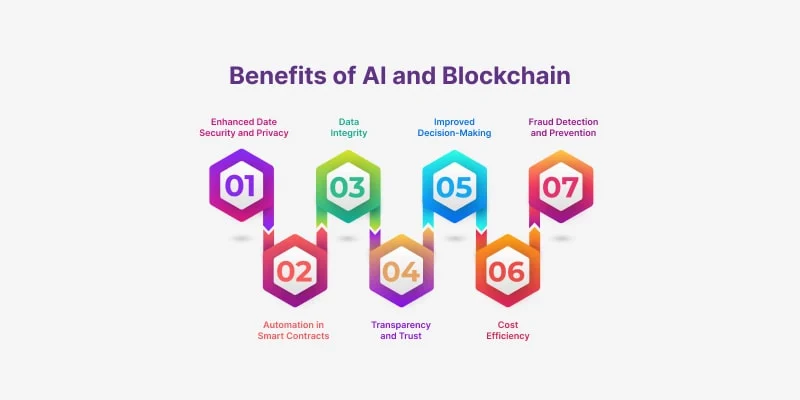
In this blog, we’ll dive into how integrating AI with blockchain offers enhanced security, transparency, and decision-making capabilities, opening up a world of possibilities for businesses.
What are AI and Blockchain?
Artificial Intelligence (AI): AI refers to the ability of machines to mimic human intelligence by processing large amounts of data, learning from patterns, and making predictions. AI can automate mundane tasks with high efficiency, saving time and reducing costs. Its ability to learn from data ensures that outcomes improve over time.
Blockchain: A blockchain is a decentralized, immutable ledger system that ensures data security and transparency. Initially created to support digital currencies like Bitcoin, blockchain is now employed across various industries, such as finance and healthcare, for secure and traceable data management.
The Power of Integrating AI and Blockchain
By combining AI’s predictive and analytical capabilities with blockchain’s security and decentralization, businesses can build solutions that are secure, transparent, and highly efficient. Here’s how these two technologies complement each other:
- Blockchain for Data Integrity: Blockchain ensures the integrity and immutability of data, providing AI with a trusted data source for analysis and predictions.
- AI for Automation and Insights: AI can analyze blockchain-stored data to automate complex processes, make accurate predictions, and provide actionable insights.
Benefits of Integrating AI and Blockchain
-
Enhanced Data Security and Privacy:
Blockchain’s decentralized ledger ensures secure data storage, reducing the risk of tampering or unauthorized access. This secure foundation allows AI to process sensitive information confidently and generate precise insights. -
Automation with Smart Contracts:
AI can automate the execution of smart contracts—self-executing contracts with terms written into code—based on real-time data analysis. For instance, in real estate, AI can process market data and trigger contract execution automatically, reducing costs and time. -
Data Integrity:
Blockchain’s immutability ensures the accuracy of data, which AI can leverage to make more reliable decisions. In sectors like finance and healthcare, the combination of AI and blockchain can revolutionize how sensitive data is processed and utilized. -
Transparency and Trust:
Blockchain’s transparent ledger enhances trust by providing an auditable trail of every transaction. AI builds on this by offering predictive insights and automating decision-making, providing end-to-end transparency in industries like supply chain management. -
Improved Decision-Making:
AI can analyze blockchain’s real-time, reliable data to make better decisions, particularly in industries where time-sensitive, data-driven insights are crucial, such as finance, logistics, and healthcare. -
Cost Efficiency:
The combination of blockchain and AI reduces the need for intermediaries, automates processes, and strengthens data security, leading to substantial cost savings for businesses. -
Fraud Detection and Prevention:
AI excels at detecting fraud by analyzing vast datasets to recognize patterns, while blockchain ensures transparent record-keeping. Together, they create a robust defense against fraud in banking, finance, and other sensitive industries.
Use Cases of AI and Blockchain Integration
-
Healthcare:
AI can analyze patient data to recommend personalized treatments, while blockchain secures the privacy and integrity of medical records. This integration improves the accuracy of diagnoses and ensures that medical data is shared only with authorized entities. -
Supply Chain Management:
Blockchain ensures transparency in tracking the movement of goods, while AI optimizes inventory and predicts future demands. This synergy can lead to more efficient supply chains, reducing inefficiencies and preventing fraud. -
Intellectual Property Rights:
In industries like software, music, and digital content, AI monitors the use of digital assets, while blockchain maintains immutable records of ownership. This combination helps protect intellectual property rights and ensures that creators receive proper compensation. -
Financial Services:
The integration of AI and blockchain allows for real-time transaction monitoring and fraud detection, transforming the financial services industry by automating transactions and ensuring transparent and secure data processing. -
Smart Contracts:
AI can trigger smart contracts on blockchain based on real-time data. In insurance, for example, AI can assess damages and automatically execute claims payouts when certain conditions are met, without the need for manual intervention.
How to Integrate AI and Blockchain
-
Identify Use Cases and Objectives:
Start by identifying the key objectives and applications where AI and blockchain can be integrated, such as improving supply chain transparency or automating financial transactions. -
Choose the Right Blockchain Platform:
Select a blockchain platform that supports smart contracts and can be integrated with AI. Popular platforms include Ethereum, Hyperledger, and EOS. -
Develop a Secure Data Infrastructure:
Ensure that the data used by AI is securely stored and immutable by leveraging blockchain’s decentralized ledger. Sensitive data, such as healthcare records, can be stored off-chain, while hashes are stored on the blockchain to verify data integrity. -
Train AI Models with Blockchain Data:
Use blockchain’s verified data to train AI models for better accuracy. For example, financial institutions can train AI models on blockchain data to detect fraudulent transactions. -
Implement Smart Contracts for Automation:
Use AI to analyze data and trigger smart contracts when certain conditions are met, automating tasks in sectors like insurance and finance. -
Ensure Compliance and Security:
Implement robust security measures and ensure compliance with regulations, as both AI and blockchain deal with sensitive data. -
Test and Scale the Solution:
Thoroughly test the integrated solution to ensure its effectiveness before scaling it to handle larger data sets or additional use cases.
Conclusion
The integration of AI and blockchain is a game-changer, offering unmatched security, transparency, and efficiency. From healthcare to finance, the combined power of AI and blockchain can revolutionize industries by automating processes, enhancing decision-making, and reducing costs. As businesses increasingly adopt these technologies, the demand for skilled developers in both AI and blockchain is set to grow.
By integrating AI and blockchain, businesses can future-proof their operations, ensuring that they remain competitive in an increasingly digital world.




